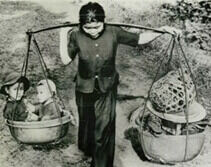Six women leaders from Vietnam who are involved as co-researchers in the BCU EnPOWER project, share their lived experiences of ‘carrying’ in their roles in higher education in Vietnam. They used visual methods to share images, stories and thoughts on each others’ posts using online platforms (Padlet). The co-researchers will co-produce a collective auto-ethnography of their experiences as women leaders in Vietnam.
EnPOWER Peer Researchers
In February 2023, an online EnPOWER project took place for the six Peer Researcher Workshop who have agreed to be involved in the EnPOWER project. The workshop was led by Dr Kate Thomas who is supporting the Peer Researchers. This workshop was the first chance for the Peer Researchers, who are all employed in Vietnamese higher education institutions to get together and begin working on the project.
The six Vietnamese Colleagues (five in Vietnam and one in Australia) attended the workshop at the end of a long working day. Thanks to our Vietnamese colleagues' engagement with this task, we started the workshop with a rich canvas of stories, comments and visuals. EnPOWER Project Manager, Dr Amanda French (BCU) also participated.
Building a collective ethnography
There are two stages to the research that our Vietnamese Peers will undertake. The first stage of their research is to generate auto-ethnographies exploring their experiences and practices as leaders or aspiring leaders. The second stage will be to build a collaborative ethnography focusing on key themes and on shared experiences, using arts-based and creative methods.
Prior to the workshop, Kate Thomas, created a Padlet featuring three thematic headings:
- Workshop Theme 1: Your career timeline/pathway in higher education
- Workshop Theme 2: A day in your working life
- Workshop Theme 3: Your experiences or practices as a leader or aspiring leader in higher education

Peer Researchers were invited to post text and/or visuals on the Padlet under any of the three themes. They were also encouraged to respond to others' posts if they wished. Yen Long, one of the participants, shared 'A day in my working life' as a women leader working in higher education in Vietnam:
In the morning, I usually list down all important things to finish in a day. Then, I have meetings with all departments, read all datas / reports of Sales/MKT/ Academic. In the afternoon, I look over students reports and comments which students need to support and which ones have improved. In the evening, I spend time to observe teachers in class and give them feedback about their teaching, class management.
Yen Long
Power of visual methods

The power of visual methods to stimulate responses and ideas was evident when a photograph (see below) was posted by Phượng Phạm which led to a lengthy discussion of experiences of 'balancing' and 'carrying' and the skills, strength and resourcefulness Vietnamese female women require to do this in relation to professional and domestic responsibilities and expectations. This then resulted in a cross-cultural discussion of the 'second shift', 'juggling' and 'hidden labour'.
"Things haven't changed much even when you are overseas, you have to shoulder all domestic and public work"
Phượng Phạm
'Carrying' in the lived experiences of Vietnamese women leaders
Again drawing on lived experience in the group we discussed how these jobs can include planning teaching sessions (and the evening meal – which you are cooking once you get in after work), creating shopping lists and meeting agendas, taking the washing out/or putting it in before you go to work (and taking it out when you get back), remembering to book dentist appointments (not only for oneself but others in the family), checking in with elderly parents/children/friends, keeping up with work emails and putting the bins out. These were just a few of things that need to 'carried out' day in and day out often without anyone else noticing.
Below are some examples of the verb 'to carry' in Vietnamese – which it would be good to expand on with actual real-life examples from our own lives.
- carry - bê vác mang gánh bồng bế bưng
- carry off - ( also the English sense – manage to do something well often against expectations) e.g. she carried off that presentation really well ) đem đi mang đi mất bắt đi
- carry out ( to do ) - tiến hành thực hiện triển khai một việc gì triển khai
- carry out (also, effect, exercise, implement, undertake) - thực hiện {vb}
- carry about - mang ai đi khắp nơi đèo bồng ai đi khắp nơi
- carry in one's arms - be
- to carry on one's back - mang vác thứ gì trên lưng
Carrying in the lived experiences of UK based women in HE
The English speakers present discovered that the Vietnamese language has 27 different verbs for 'to carry' depending on who or what is being carried. Some of the above terms have obvious gendered applications for example, 'to carry in one's arms', with regard say to childcare responsibilities for small children which most often fall to women. Amanda French recalled her strong memories of marking assignments with her son in her arms, who was teething and wouldn't settle unless she held him close to me. Other uses of the verb are more generic, for example to 'carry out', yet we wondered if it is the sheer number and diversity of jobs women 'carry out' successfully in any given day that is noteworthy, as they often seamlessly cross the divide between their professional and private lives.
Next steps
The EnPower Team intend to follow up the discussion on 'carrying' in the next EnPOWER Community of Practice with a view to capturing what and how our members felt they were carrying in their professional and private lives. There are clearly many overlaps between the experiences of women working in HE in both UK and Vietnam however we suspect there will also be important differences.
